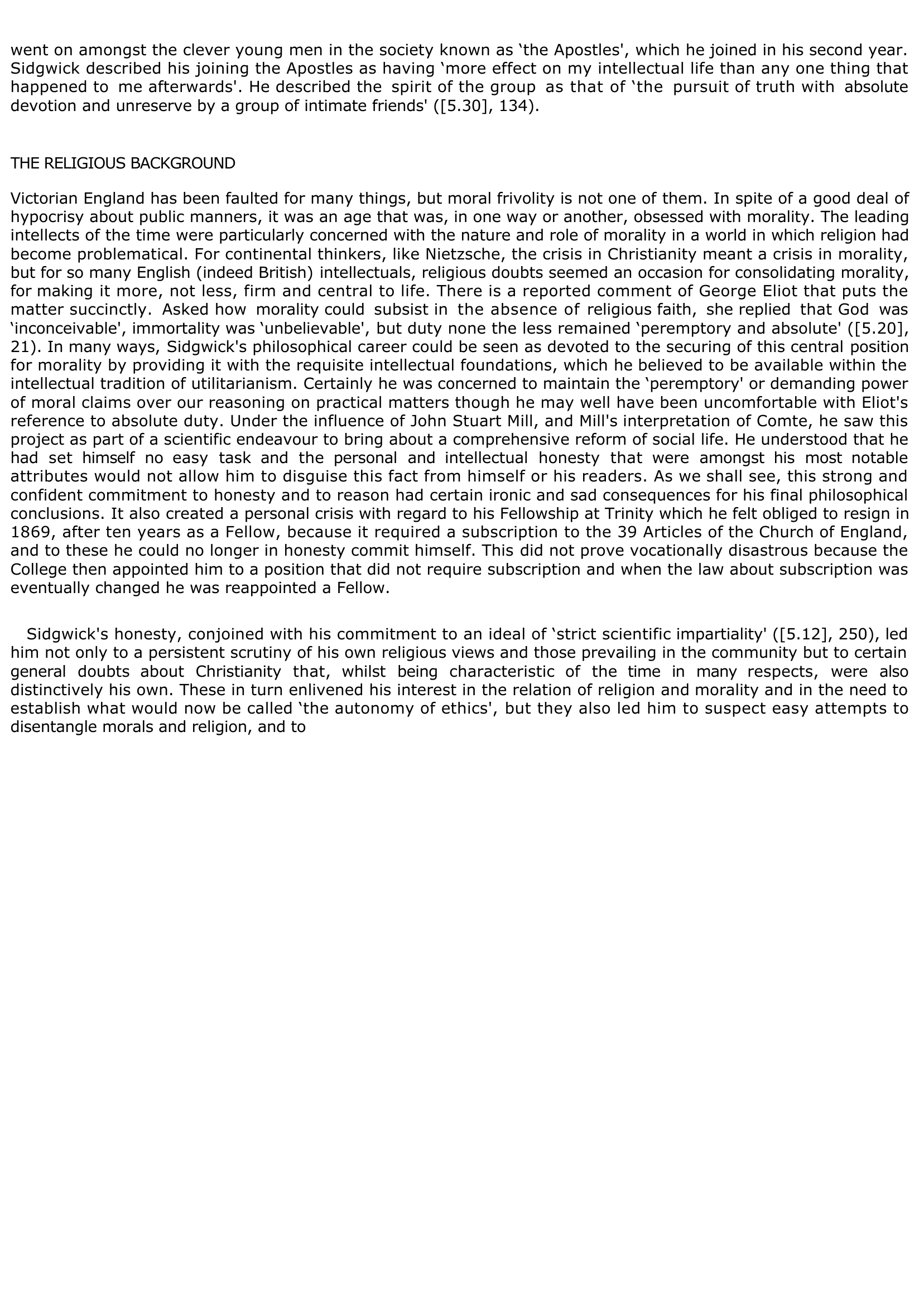Encyclopedia of Philosophy: Sidgwick
Publié le 09/01/2010

Extrait du document
Unlike John Stuart Mill or Jeremy Bentham, Henry Sidgwick’s is hardly a household name in intellectual circles beyond the world of professional philosophy. His standing amongst many contemporary moral philosophers as possibly the greatest nineteenthcentury writer on ethics would come as a shock to such householders, as would C.D. Broad’s estimate of his book The Methods of Ethics as ‘one of the English philosophical classics’ and ‘on the whole the best treatise on moral theory that has ever been written’ ([5.15], 143). This high reputation could indeed be disputed, but it is not at all idiosyncratic. It is a reputation that has grown since his own time, and is probably at its peak today, but Sidgwick’s intellectual power impressed many of his contemporaries, and immediate successors, as well. ‘Pure, white light’ was one description offered of his intellectual presence ([5.13], 181), and the adjective ‘pure’ tells as much about the moral intensity with which he applied his mind to the problems that exercised him as the word ‘light’ testifies to the clarifying power of his intelligence.
«
went on amongst the clever young men in the society known as ‘the Apostles', which he joined in his second year. Sidgwick described his joining the Apostles as having ‘more effect on my intellectual life than any one thing thathappened to me afterwards'.
He described the spirit of the group as that of ‘the pursuit of truth with absolute devotion and unreserve by a group of intimate friends' ([5.30], 134).
THE RELIGIOUS BACKGROUND
Victorian England has been faulted for many things, but moral frivolity is not one of them.
In spite of a good deal of hypocrisy about public manners, it was an age that was, in one way or another, obsessed with morality.
The leading intellects of the time were particularly concerned with the nature and role of morality in a world in which religion had become problematical.
For continental thinkers, like Nietzsche, the crisis in Christianity meant a crisis in morality,but for so many English (indeed British) intellectuals, religious doubts seemed an occasion for consolidating morality, for making it more, not less, firm and central to life.
There is a reported comment of George Eliot that puts the matter succinctly.
Asked how morality could subsist in the absence of religious faith, she replied that God was ‘inconceivable', immortality was ‘unbelievable', but duty none the less remained ‘peremptory and absolute' ([5.20], 21).
In many ways, Sidgwick's philosophical career could be seen as devoted to the securing of this central position for morality by providing it with the requisite intellectual foundations, which he believed to be available within the intellectual tradition of utilitarianism.
Certainly he was concerned to maintain the ‘peremptory' or demanding power of moral claims over our reasoning on practical matters though he may well have been uncomfortable with Eliot's reference to absolute duty.
Under the influence of John Stuart Mill, and Mill's interpretation of Comte, he saw this project as part of a scientific endeavour to bring about a comprehensive reform of social life.
He understood that hehad set himself no easy task and the personal and intellectual honesty that were amongst his most notable attributes would not allow him to disguise this fact from himself or his readers.
As we shall see, this strong and confident commitment to honesty and to reason had certain ironic and sad consequences for his final philosophical conclusions.
It also created a personal crisis with regard to his Fellowship at Trinity which he felt obliged to resign in 1869, after ten years as a Fellow, because it required a subscription to the 39 Articles of the Church of England, and to these he could no longer in honesty commit himself.
This did not prove vocationally disastrous because the College then appointed him to a position that did not require subscription and when the law about subscription was eventually changed he was reappointed a Fellow.
Sidgwick's honesty, conjoined with his commitment to an ideal of ‘strict scientific impartiality' ([5.12], 250), led him not only to a persistent scrutiny of his own religious views and those prevailing in the community but to certain general doubts about Christianity that, whilst being characteristic of the time in many respects, were also distinctively his own.
These in turn enlivened his interest in the relation of religion and morality and in the need to establish what would now be called ‘the autonomy of ethics', but they also led him to suspect easy attempts to disentangle morals and religion, and to.
»
↓↓↓ APERÇU DU DOCUMENT ↓↓↓
Liens utiles
- Encyclopedia of Philosophy: al-Ghazali, Abu Hamid
- Encyclopedia of Philosophy: al-Farabi, Abu Nasr
- Encyclopedia of Philosophy: Alexander, Samuel
- Encyclopedia of Philosophy: Alexander of Hales
- Encyclopedia of Philosophy: Alexander of Aphrodisias

































